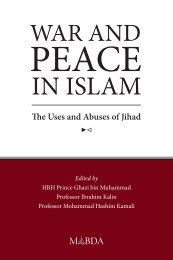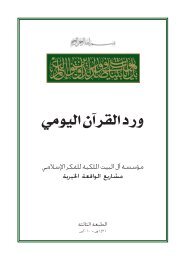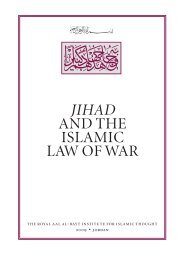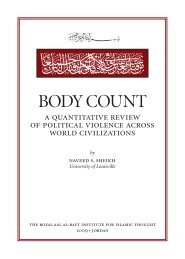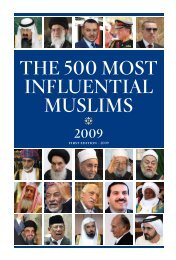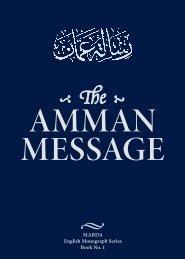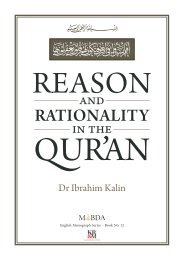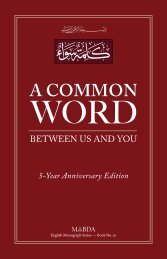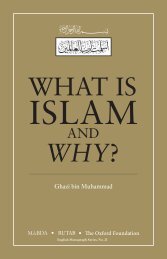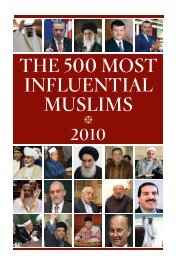Al-W¥^idÏ's Asb¥b al-Nuz‰l - The Royal Islamic Strategic Studies ...
Al-W¥^idÏ's Asb¥b al-Nuz‰l - The Royal Islamic Strategic Studies ...
Al-W¥^idÏ's Asb¥b al-Nuz‰l - The Royal Islamic Strategic Studies ...
You also want an ePaper? Increase the reach of your titles
YUMPU automatically turns print PDFs into web optimized ePapers that Google loves.
Chapter 2: Surah <strong>al</strong>-Baqarah<br />
Qatadah and <strong>al</strong>-Suddi said: “This refers to Bukhtunassar and his army who conquered the Jews and<br />
destroyed Jerus<strong>al</strong>em. <strong>The</strong>y were helped in this by the Roman Christians”. 25<br />
And Ibn ‘Abbas said, according to the narration of ‘Ata’: “This verse was reve<strong>al</strong>ed about the idolaters of<br />
Mecca who prevented the Muslims from mentioning <strong>Al</strong>lah in the Sacred Mosque”. 26<br />
(Unto <strong>Al</strong>lah belong the East and the West…) [2:115].<br />
<strong>The</strong>re is a scholarly disagreement regarding the occasion of revelation of this Qur’anic verse. Abu Mansur<br />
<strong>al</strong>-Mansuri informed us> <strong>al</strong>-Hafiz ‘<strong>Al</strong>i ibn ‘Umar> Abu Muhammad Isma‘il ibn ‘<strong>Al</strong>i> <strong>al</strong>-Hasan ibn ‘<strong>Al</strong>i<br />
ibn Shabib <strong>al</strong>-‘Umari> Ahmad ibn ‘Ubayd <strong>Al</strong>lah ibn <strong>al</strong>-Hasan <strong>al</strong>-‘Anbari who said: “I found written in<br />
my father’s epistle: ‘Abd <strong>al</strong>-M<strong>al</strong>ik <strong>al</strong>-‘Arzami narrated to us> ‘Ata’ ibn Rabah> Jabir ibn ‘Abd <strong>al</strong>-M<strong>al</strong>ik who<br />
said: ‘<strong>The</strong> Messenger of <strong>Al</strong>lah, <strong>Al</strong>lah bless him and give him peace, sent a military expedition in which<br />
I was present. It was dark and so we could not determine the precise direction of the qiblah. Some of us<br />
said: we know the exact direction; it is toward the North. <strong>The</strong>y prayed and drew lines. Some others said:<br />
the qiblah is toward the South. <strong>The</strong>y prayed and drew lines. When it was morning and the sun had risen<br />
up, they discovered that their lines were pointed to a different direction to that of the qiblah. When we<br />
returned from our journey we asked the Prophet, <strong>Al</strong>lah bless him and give him peace, about this but he<br />
did not give us an answer. <strong>Al</strong>lah, ex<strong>al</strong>ted is He, then reve<strong>al</strong>ed this verse (Unto <strong>Al</strong>lah belong the East and<br />
the West…)’ ”. 27<br />
Abu Mansur informed us> ‘<strong>Al</strong>i> Yahya ibn Sa‘id>Muhammad ibn Isma‘il <strong>al</strong>-Ahmasi> Waki‘> Ash‘ath<br />
<strong>al</strong>-Samman> ‘Asim ibn ‘Ubayd <strong>Al</strong>lah> ‘Abd <strong>Al</strong>lah ibn ‘Amir ibn Rabi‘ah> his father who said: “We were<br />
praying with the Prophet, <strong>Al</strong>lah bless him and give him peace, while on a journey. And because it was a<br />
dark night we could not determine the precise direction of the qiblah. Each man prayed toward whichever<br />
direction he thought was right. In the following morning, we mentioned what had happened to<br />
the Prophet, <strong>Al</strong>lah bless him and give him peace, and then the verse (Unto <strong>Al</strong>lah belong the East and the<br />
West…) was reve<strong>al</strong>ed”. 28<br />
Ibn ‘Umar is of the opinion that the above verse is about voluntary offering of supererogatory prayers.<br />
Abu’l-Qasim ibn Sa‘dan informed us> Muhammad ibn ‘Abd <strong>Al</strong>lah <strong>al</strong>-Hafiz> Muhammad ibn Ya‘qub><br />
Abu’l-Bukhturi ‘Abd <strong>Al</strong>lah ibn Muhammad ibn Shakir> Abu Usamah> ‘Abd <strong>al</strong>-M<strong>al</strong>ik ibn Sulayman><br />
Sa‘id ibn Jubayr> Ibn ‘Umar who said: “<strong>The</strong> verses (Unto <strong>Al</strong>lah belong the East and the West…) was<br />
reve<strong>al</strong>ed so that one prays toward whatever direction one’s mount directs one upon offering supererogatory<br />
prayer”. 29<br />
Said Ibn ‘Abbas, according to the narration of ‘Ata’: “When the Negus died, Gabriel came to the Prophet,<br />
<strong>Al</strong>lah bless him and give him peace, and said: ‘<strong>The</strong> Negus has died, so perform the prayer of the dead<br />
over him’. <strong>The</strong> Messenger of <strong>Al</strong>lah, <strong>Al</strong>lah bless him and give him peace, summoned his Companions,<br />
<strong>al</strong>igned them in rows, went to the front and said: ‘<strong>Al</strong>lah has commanded me to perform the prayer of the<br />
dead over the Negus who has died, so do pray over him’. And the Messenger of <strong>Al</strong>lah, <strong>Al</strong>lah bless him<br />
and give him peace, and his Companions prayed over him. <strong>The</strong> Companions of the Messenger of <strong>Al</strong>lah,<br />
<strong>Al</strong>lah bless him and give him peace, said in between themselves: ‘How could we possibly pray over a man<br />
who prayed toward other than our own qiblah’, this is because the Negus prayed toward Jerus<strong>al</strong>em which<br />
was the qiblah until he died but which was subsequently changed toward the Ka‘bah. <strong>Al</strong>lah, ex<strong>al</strong>ted is He,<br />
25<br />
Ayoub, p. 145. But Abu Bakr <strong>al</strong>-Razi, among other Qur’anic commentators, noticed that Bukhtunassar lived long before the birth<br />
of Christ and so he could not have been helped by the Christians in his sacking of Jerus<strong>al</strong>em.<br />
26<br />
Ibn ‘Abbas refers here to the incident of Hudaybiyyah. Cf. Ayoub, p. 145.<br />
27<br />
Durr, :266-267.<br />
28<br />
Ayoub, pp. 146-147.<br />
29<br />
Ayoub, p. 148; Durr, :266.<br />
15



